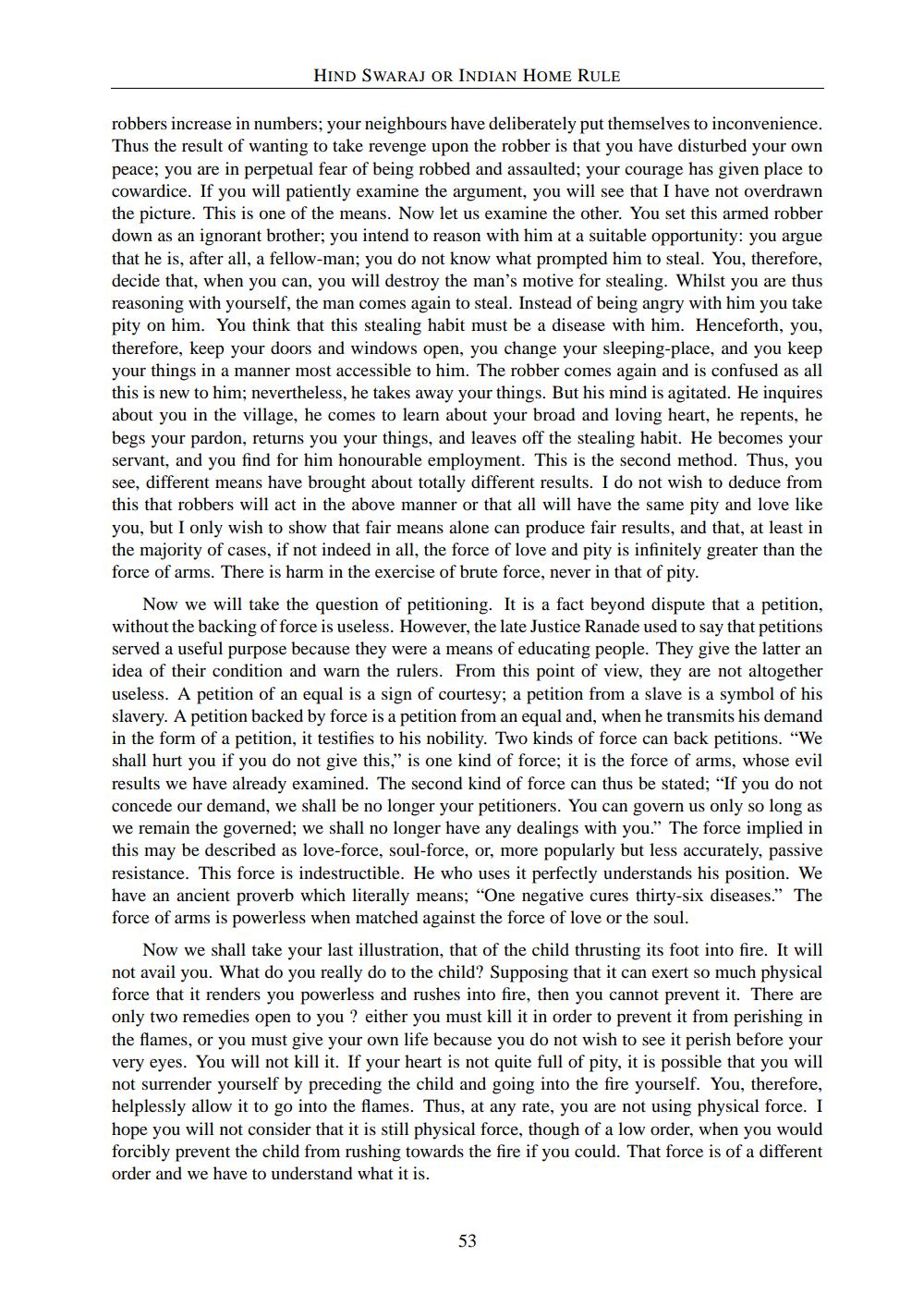________________
HIND SWARAJ OR INDIAN HOME RULE
robbers increase in numbers; your neighbours have deliberately put themselves to inconvenience. Thus the result of wanting to take revenge upon the robber is that you have disturbed your own peace; you are in perpetual fear of being robbed and assaulted; your courage has given place to cowardice. If you will patiently examine the argument, you will see that I have not overdrawn the picture. This is one of the means. Now let us examine the other. You set this armed robber down as an ignorant brother; you intend to reason with him at a suitable opportunity: you argue that he is, after all, a fellow-man; you do not know what prompted him to steal. You, therefore, decide that, when you can, you will destroy the man's motive for stealing. Whilst you are thus reasoning with yourself, the man comes again to steal. Instead of being angry with him you take pity on him. You think that this stealing habit must be a disease with him. Henceforth, you, therefore, keep your doors and windows open, you change your sleeping-place, and you keep your things in a manner most accessible to him. The robber comes again and is confused as all this is new to him; nevertheless, he takes away your things. But his mind is agitated. He inquires about you in the village, he comes to learn about your broad and loving heart, he repents, he begs your pardon, returns you your things, and leaves off the stealing habit. He becomes your servant, and you find for him honourable employment. This is the second method. Thus, you see, different means have brought about totally different results. I do not wish to deduce from this that robbers will act in the above manner or that all will have the same pity and love like you, but I only wish to show that fair means alone can produce fair results, and that, at least in the majority of cases, if not indeed in all, the force of love and pity is infinitely greater than the force of arms. There is harm in the exercise of brute force, never in that of pity.
Now we will take the question of petitioning. It is a fact beyond dispute that a petition, without the backing of force is useless. However, the late Justice Ranade used to say that petitions served a useful purpose because they were a means of educating people. They give the latter an idea of their condition and warn the rulers. From this point of view, they are not altogether useless. A petition of an equal is a sign of courtesy; a petition from a slave is a symbol of his slavery. A petition backed by force is a petition from an equal and, when he transmits his demand in the form of a petition, it testifies to his nobility. Two kinds of force can back petitions. "We shall hurt you if you do not give this," is one kind of force; it is the force of arms, whose evil results we have already examined. The second kind of force can thus be stated; "If you do not concede our demand, we shall be no longer your petitioners. You can govern us only so long as we remain the governed; we shall no longer have any dealings with you." The force implied in this may be described as love-force, soul-force, or, more popularly but less accurately, passive resistance. This force is indestructible. He who uses it perfectly understands his position. We have an ancient proverb which literally means; "One negative cures thirty-six diseases." The force of arms is powerless when matched against the force of love or the soul.
Now we shall take your last illustration, that of the child thrusting its foot into fire. It will not avail you. What do you really do to the child? Supposing that it can exert so much physical force that it renders you powerless and rushes into fire, then you cannot prevent it. There are only two remedies open to you? either you must kill it in order to prevent it from perishing in the flames, or you must give your own life because you do not wish to see it perish before your very eyes. You will not kill it. If your heart is not quite full of pity, it is possible that you will not surrender yourself by preceding the child and going into the fire yourself. You, therefore, helplessly allow it to go into the flames. Thus, at any rate, you are not using physical force. I hope you will not consider that it is still physical force, though of a low order, when you would forcibly prevent the child from rushing towards the fire if you could. That force is of a different order and we have to understand what it is.
53




